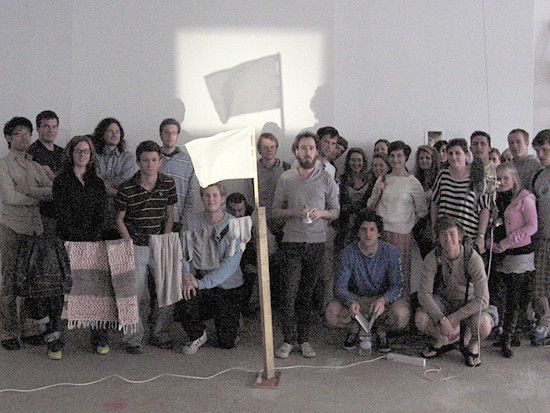Ariel Reichman: Legal Settlement
30 Apr - 31 May 2009
public reception Thursday April 30, 19:00
That it shall be known, to all of Israel, to all of the world and to all the nations of the world. That they shall know that we have arrived at home! And when we have arrived home, they shall know, that no force in the world will move us from here.
– Rabbi Zvi Yehuda Kook (named after Rabbi Naftali Zvi Yehuda Berlin), 1975.
Does the pursuit of sovereign rights necessarily result in the suppression of others' rights to the same? For a period of six weeks between April and May, PROGRAM has invited Israeli artist Ariel Reichman to take up residence in the public space of the gallery at Invalidenstraße 115. By repurposing the gallery into a laboratory for living—a home, even—Legal Settlement will explore the intentions and desires to inscribe boundary, territory and ownership on place. A performative exercise in habitation, Reichman will code the space through a number of personal and ideological rituals accumulating over time.
Reichman writes:
___My “residence” at PROGRAM has met with no resistance on any side. My settlement is a legitimate one. But what I will bring with me to PROGRAM is an ideology—which will slowly develop into an intimate identity and personality within the space of the gallery. It is not the physical shape of a house or an “abandoned” hill, but rather acts of ritual and idealistic national thought that are inherent to the settlement. The reckless earnestness of the “youth of the hills,” the noar hagvaot who primitively occupy hilltops of the West Bank, surviving on cultural dogma and conviction, serve as a point of departure for the exhibition.
At the heart of the settlement project is the controversy over those symbolic behaviors which constitute “ownership”—in the tangibly-felt, sometimes-political sense of the word. How and when does the banal act of everyday living, of presence, develop the brazen teeth of a particular agenda?
Please visit www.programonline.de/legalsettlement.html for more information.
Ariel Reichman was born in South Africa in 1979 and immigrated to Israel in 1991. He studied at the Bezalel Academy of Art and Design in Jerusalem and the U.D.K. Berlin with Katharina Sieverding and Hito Steyerl. He has participated in numerous group exhibitions including most recently Kunst und Öffentlichkeit (NBK, Berlin, 2009), Emergency Art (Art Neuland, Berlin, 2009), The political body (Tel Aviv, 2008), 5th Berliner Kunstsalon (Berlin, 2008), Tape Modern No. 4 (Berlin 2008) and Slick Paris ’08. His most recent solo exhibition How Can I Say Something About Them If You Don’t Know Who I Am took place at e.l. Bannwarth Gallerie, in Paris in 2008. Reichman was awarded the lbb Prize for Photography by the Karl Hofer Foundation in 2008. He lives and works in Berlin. Legal Settlement is Reichman's first solo show in Berlin.
That it shall be known, to all of Israel, to all of the world and to all the nations of the world. That they shall know that we have arrived at home! And when we have arrived home, they shall know, that no force in the world will move us from here.
– Rabbi Zvi Yehuda Kook (named after Rabbi Naftali Zvi Yehuda Berlin), 1975.
Does the pursuit of sovereign rights necessarily result in the suppression of others' rights to the same? For a period of six weeks between April and May, PROGRAM has invited Israeli artist Ariel Reichman to take up residence in the public space of the gallery at Invalidenstraße 115. By repurposing the gallery into a laboratory for living—a home, even—Legal Settlement will explore the intentions and desires to inscribe boundary, territory and ownership on place. A performative exercise in habitation, Reichman will code the space through a number of personal and ideological rituals accumulating over time.
Reichman writes:
___My “residence” at PROGRAM has met with no resistance on any side. My settlement is a legitimate one. But what I will bring with me to PROGRAM is an ideology—which will slowly develop into an intimate identity and personality within the space of the gallery. It is not the physical shape of a house or an “abandoned” hill, but rather acts of ritual and idealistic national thought that are inherent to the settlement. The reckless earnestness of the “youth of the hills,” the noar hagvaot who primitively occupy hilltops of the West Bank, surviving on cultural dogma and conviction, serve as a point of departure for the exhibition.
At the heart of the settlement project is the controversy over those symbolic behaviors which constitute “ownership”—in the tangibly-felt, sometimes-political sense of the word. How and when does the banal act of everyday living, of presence, develop the brazen teeth of a particular agenda?
Please visit www.programonline.de/legalsettlement.html for more information.
Ariel Reichman was born in South Africa in 1979 and immigrated to Israel in 1991. He studied at the Bezalel Academy of Art and Design in Jerusalem and the U.D.K. Berlin with Katharina Sieverding and Hito Steyerl. He has participated in numerous group exhibitions including most recently Kunst und Öffentlichkeit (NBK, Berlin, 2009), Emergency Art (Art Neuland, Berlin, 2009), The political body (Tel Aviv, 2008), 5th Berliner Kunstsalon (Berlin, 2008), Tape Modern No. 4 (Berlin 2008) and Slick Paris ’08. His most recent solo exhibition How Can I Say Something About Them If You Don’t Know Who I Am took place at e.l. Bannwarth Gallerie, in Paris in 2008. Reichman was awarded the lbb Prize for Photography by the Karl Hofer Foundation in 2008. He lives and works in Berlin. Legal Settlement is Reichman's first solo show in Berlin.

